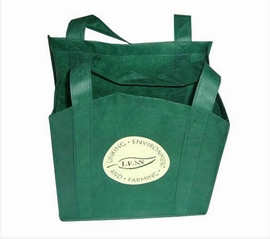 The Los Angeles City Council took the first step on Tuesday towars making the city the largest U.S. municipality to ban plastic bags at the grocery store, with the goal of keeping them out of streets, beaches and the Pacific Ocean.
The Los Angeles City Council took the first step on Tuesday towars making the city the largest U.S. municipality to ban plastic bags at the grocery store, with the goal of keeping them out of streets, beaches and the Pacific Ocean.The council voted 11-1 to give preliminary approval to the measure, which would outlaw plastic while allowing consumers to buy a paper bag for a set price of 10 cents as a means of encouraging them to bring a re-usable sack.
The rules would apply to businesses from supermarkets to drug stores that sell groceries, and the plan has the support of both environmentalists and the California Grocers Association.
City officials estimate the ordinance would eliminate 2 billion plastic bags a year after if it goes into effect on Jan. 1, 2014, for large stores and six months later for smaller establishments.
First, the measure must return to the City Council next week for another vote so it can be officially adopted.
"We've seen plastic bags clogging our gutters, polluting our rivers and piling up on our beaches," Los Angeles City Councilman Jose Huizar said in a statement.
He added that the proposed ban "sends a strong and clear message to every big city in the nation" to follow the lead of Los Angeles.
Nearly 80 local governments in California, including San Francisco and San Jose, have already banned plastic bags, as has Maui County, Hawaii. If the Los Angeles measure goes into effect, one-quarter of California residents would live in a municipality that bans bags, said Ron Fong, president and CEO of the California Grocers Association.
Some environmentalists are pushing for New York to ban plastic grocery sacks as well.
Such measures are needed because bags that drift into waterways harm birds and fish, who often mistake little bits of plastic for morsels of food, said Kirsten James, science and policy director for environmental group Heal the Bay.
Researchers have identified film from sacks as a major source of the plastic swirling around in a vortex created by ocean currents in the north Pacific, James said.
"There's obviously an addiction in our society to single-use products and single-use plastics, and this law is a jumping point to take a look at our disposable society," she said.
Fong said his organization does not see the ban as imposing a large financial cost on retailers. "Really the inconvenience will be the education to our consumers," he said.
The Los Angeles City Council ordinance would allow poor people on food stamps or other forms of federal assistance to obtain a paper bag for free.
Plastic bag prohibitions are opposed by the sack manufacturing and recycling firm Hilex Poly, which on its website Bag the Ban notes that 90 percent of consumers reuse their plastic bags.
A representative from South Carolina-based Hilex Poly could not be reached for comment.





